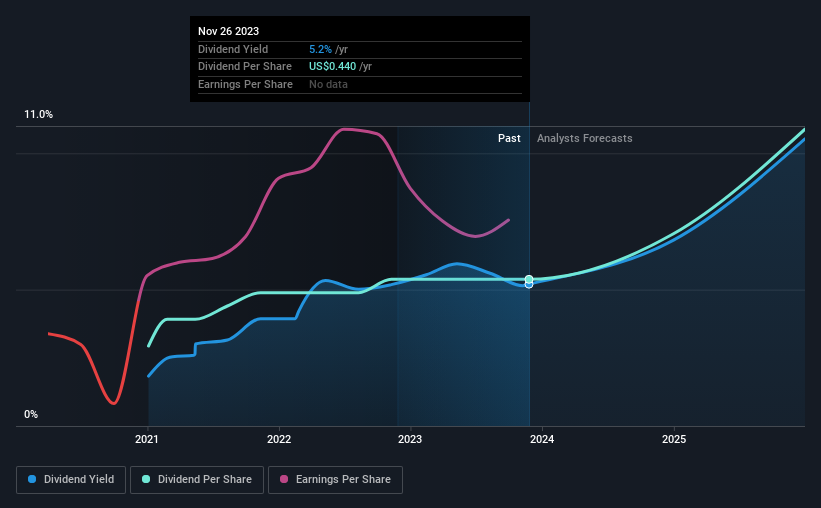Here's Why We're Wary Of Buying Grosvenor Capital Management's (NASDAQ:GCMG) For Its Upcoming Dividend
Grosvenor Capital Management, L.P. (NASDAQ:GCMG) stock is about to trade ex-dividend in three days. The ex-dividend date occurs one day before the record date which is the day on which shareholders need to be on the company's books in order to receive a dividend. It is important to be aware of the ex-dividend date because any trade on the stock needs to have been settled on or before the record date. Accordingly, Grosvenor Capital Management investors that purchase the stock on or after the 30th of November will not receive the dividend, which will be paid on the 15th of December.
The company's next dividend payment will be US$0.11 per share, and in the last 12 months, the company paid a total of US$0.44 per share. Based on the last year's worth of payments, Grosvenor Capital Management stock has a trailing yield of around 5.2% on the current share price of $8.46. Dividends are an important source of income to many shareholders, but the health of the business is crucial to maintaining those dividends. So we need to investigate whether Grosvenor Capital Management can afford its dividend, and if the dividend could grow.
View our latest analysis for Grosvenor Capital Management
If a company pays out more in dividends than it earned, then the dividend might become unsustainable - hardly an ideal situation. Grosvenor Capital Management distributed an unsustainably high 136% of its profit as dividends to shareholders last year. Without more sustainable payment behaviour, the dividend looks precarious.
When the dividend payout ratio is high, as it is in this case, the dividend is usually at greater risk of being cut in the future.
Click here to see the company's payout ratio, plus analyst estimates of its future dividends.
Have Earnings And Dividends Been Growing?
Companies with falling earnings are riskier for dividend shareholders. If business enters a downturn and the dividend is cut, the company could see its value fall precipitously. Grosvenor Capital Management's earnings have collapsed faster than Wile E Coyote's schemes to trap the Road Runner; down a tremendous 52% a year over the past five years.
The main way most investors will assess a company's dividend prospects is by checking the historical rate of dividend growth. In the last three years, Grosvenor Capital Management has lifted its dividend by approximately 22% a year on average. The only way to pay higher dividends when earnings are shrinking is either to pay out a larger percentage of profits, spend cash from the balance sheet, or borrow the money. Grosvenor Capital Management is already paying out 136% of its profits, and with shrinking earnings we think it's unlikely that this dividend will grow quickly in the future.
To Sum It Up
Has Grosvenor Capital Management got what it takes to maintain its dividend payments? Not only are earnings per share shrinking, but Grosvenor Capital Management is paying out a disconcertingly high percentage of its profit as dividends. Generally we think dividend investors should avoid businesses in this situation, as high payout ratios and declining earnings can lead to the dividend being cut. All things considered, we're not optimistic about its dividend prospects, and would be inclined to leave it on the shelf for now.
Having said that, if you're looking at this stock without much concern for the dividend, you should still be familiar of the risks involved with Grosvenor Capital Management. Be aware that Grosvenor Capital Management is showing 6 warning signs in our investment analysis, and 2 of those make us uncomfortable...
A common investing mistake is buying the first interesting stock you see. Here you can find a full list of high-yield dividend stocks.
Have feedback on this article? Concerned about the content? Get in touch with us directly. Alternatively, email editorial-team (at) simplywallst.com.
This article by Simply Wall St is general in nature. We provide commentary based on historical data and analyst forecasts only using an unbiased methodology and our articles are not intended to be financial advice. It does not constitute a recommendation to buy or sell any stock, and does not take account of your objectives, or your financial situation. We aim to bring you long-term focused analysis driven by fundamental data. Note that our analysis may not factor in the latest price-sensitive company announcements or qualitative material. Simply Wall St has no position in any stocks mentioned.

